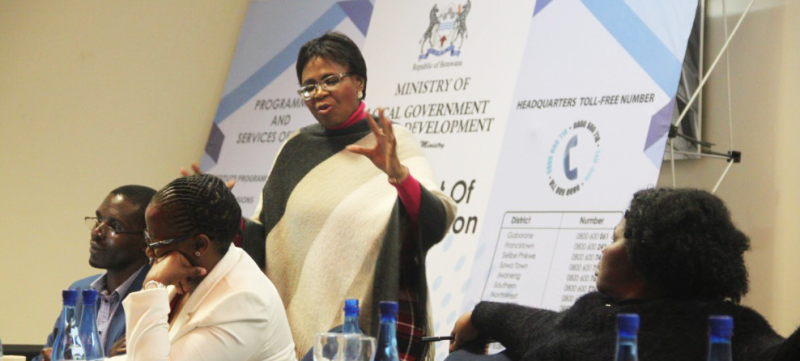Where We Work
See our interactive map


Boipelo Seitlhamo (center) presents findings from an assessment of Botswana's existing system for accessing social protection services for orphans and vulnerable children. Photo courtesy of IntraHealth International.
Social service workers face heavy caseloads, big expectations, and even suspicion from their communities.
IntraHealth International has joined the Call to Action: Strengthening the Social Service Workforce to Better Protect Children and Achieve the SDGs.
This call is close to our hearts, because our mission—which is to improve the performance of health workers and strengthen the systems in which they work—includes social service workers, from government-employed social workers to trained community case workers or volunteers on child-protection committees. They play a key role in connecting vulnerable children and families to services, including health services, and work hand-in-hand with health workers to achieve a world in which everyone everywhere has the health care they need to thrive.
This inclusive commitment is what motivated our choice to sign on to the call and its specific recommended actions align with much of our work in health and social welfare systems and workforce strengthening.
One professional covers several villages. It's difficult for them to meet expectations.
For example, in Botswana, we’re a partner on two USAID-funded projects that are improving the lives of orphans and vulnerable children and their families. One is the Catholic Relief Services (CRS)-led Coordinating Comprehensive Care for Children (4Children) project, where IntraHealth worked alongside the government of Botswana and USAID on the qualitative portion of a national situational analysis of orphans and vulnerable children (OVC).
The analysis revealed the high caseloads district social workers experience (especially given that one professional covers several villages), and how difficult it is for them to meet expectations. They face the heavy burden of administering assessments for households that need government cash transfers / OVC grants, and suspicion from community members, some of whom accuse them of corruption when their households are deemed ineligible for assistance.
“We know the community does not like us,” one respondent told us. “They think we are corrupt, when we are following the policy. They think we have bad attitudes, when we are overworked and overburdened.”
A motivated, well-equipped workforce is essential for providing high-quality services—and to providing a safety net for the families most at risk. The results show us some of the challenges to making that workforce a reality in Botswana.
Under the Project Concern International (PCI)-led Botswana Comprehensive Care and Support for Orphans and Vulnerable Children project—which empowers communities to seek, support, and provide HIV/AIDS-related services to OVC and their parents/caregivers—we’ve used what we learned from the situational analysis to support government systems and workforce strengthening efforts at the national level.
The results will inform a new national framework to deliver better services to orphans and vulnerable children.
We’re doing this mainly by seconding a senior technical advisor to the Ministry of Local Government and Rural Development, which is the primary custodian of OVC, particularly the Department of Social Protection and the Department of Community Development.
So far, we’ve helped:
Findings from the assessment point to a need for more effective policy dissemination, so that across sectors and down to the civil society organization (CSO) level, all those who are involved in delivering services to OVC are clear on their roles, responsibilities, and reporting requirements, as well as joint planning at the district level with CSOs, since they are one of the major partners in OVC programming in Botswana.
“OVC problems require a multisectoral approach,” one government policymaker shared during the assessment, “and that calls for information-sharing, joint planning, and partnership in program implementation. If there is poor coordination, the management of the programs will be compromised, hence negatively affecting the quality of service provision.”
According to Ms. Boipelo Seitlhamo, senior social service workforce advisor with the project, internal consultative meetings on the report results “created dialogue with the Department of Social Protection and paved the way for developing an action plan that prioritizes response to gaps in knowledge and implementation of policies, reporting and referrals, including a mechanism for tracking and documenting OVC interventions.”
After the report results and recommendations are widely disseminated, the project plans to work with the Department of Social Projection, the lead agency in rolling out a revised enrollment system that will ensure all eligible children are assessed, registered, and receive benefits in line with the Children’s Act. The results will also inform a new national framework for forging effective working relationships between government and CSOs to deliver better services for OVC.
For decades, IntraHealth has worked to improve health and social systems around the world, partnering with countries to better plan, develop, and support their frontline workforces. And as the HIV epidemic continues and other threats—such as Ebola and Zika outbreaks and global refugee crises—grow, so will the needs of vulnerable children and their families. Our work is far from done.
IntraHealth International was the host and a fiscal sponsor of the Global Social Service Workforce Alliance from 2012 to 2016 under the USAID-funded global CapacityPlus Project.
This post originally appeared on the Social Service Workforce Alliance blog under the headline Improving Care for OVC through Systems Strengthening in Botswana.
Get the latest updates from the blog and eNews




